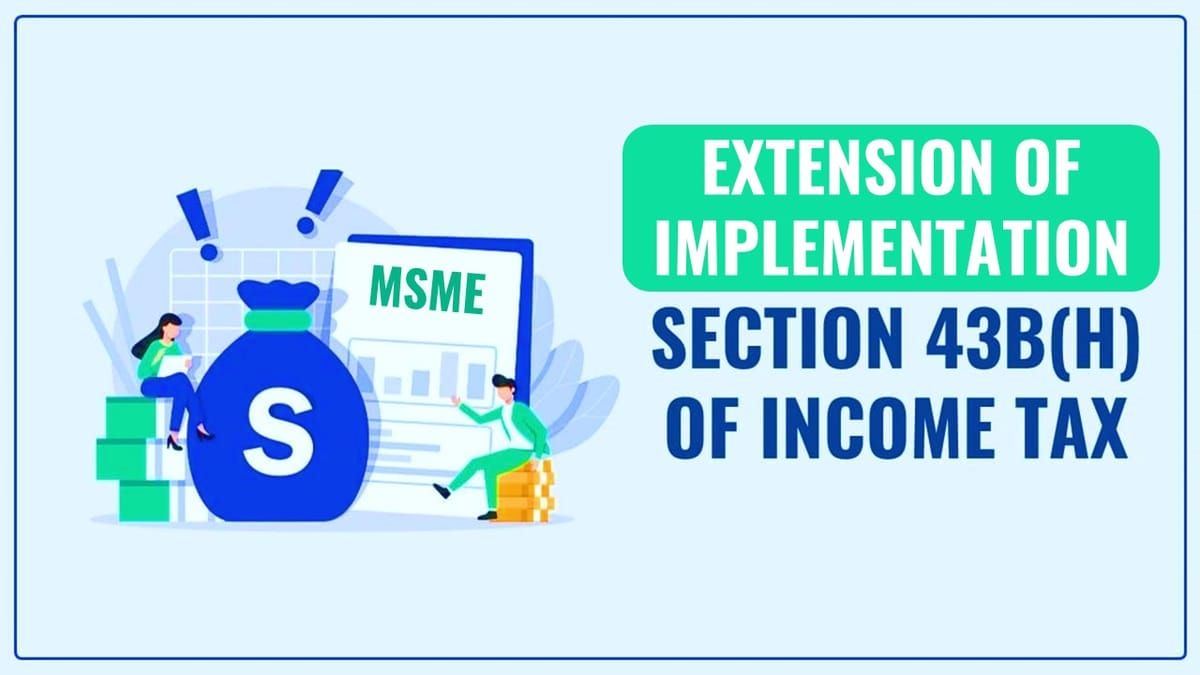In 2023, the government introduced Section 43B(h), which focuses on the protection of Micro, Small, and Medium Enterprises (MSMEs).
Reetu | Feb 24, 2024 |

Industry seeks for Extension of the implementation of Section 43B(h)
In 2023, the government introduced Section 43B(h), which focuses on the protection of Micro, Small, and Medium Enterprises (MSMEs).
This section aims to protect the interests of these essential contributors to the Indian economy by mandating that buyers make timely payments to MSMEs for products purchased. However, the implications of this rule, notably for the Assessment Year (AY) 2024-2025, have prompted debate and concern in a variety of industries.
The essence of the matter is the need that customers to settle dues for items purchased from MSMEs within 45 days after purchase.
Furthermore, all outstanding payments must be cleared before the financial year’s conclusion on March 31, 2024. Failure to comply with these regulations results in pending payments being treated as income and subject to taxation. However, if the purchase is made in February or March and the payment is received within 45 days, the purchase will be recognized as a deduction.
MSMEs welcomed this regulatory intervention as a way to address the recurrent problem of late payments, which frequently cripple cash flows and jeopardize growth potential.
However, the consequences of such strict deadlines resonate throughout the business landscape, generating varying reactions from stakeholders.
While many saw it as a lifeline for small businesses facing liquidity limitations owing to late payments, exporters and wholesalers expressed strong opposition, citing practical challenges and negative repercussions on their operations.
The textile industry, for example, has expressed worries about the feasibility of the shorter payment cycle. The industry, which has traditionally used extended payment terms ranging from 90 to 120 days, expects substantial disruptions.
Such rapid adjustments could result in order cancellations and a potential shift in favour of larger firms or non-registered entities, undercutting the entire purpose of assisting MSMEs.
Similarly, the chemicals trade sector predicts potential consequences, albeit with less certainty. While there is little immediate impact, concerns about the long-term consequences remain.
The overall fear is that the sector will not survive undamaged, mirroring sentiments shared by other industries.
Furthermore, observations from various industry sources highlighted the deep network of global trade dynamics. Export-oriented businesses, particularly those that serve African countries like Sri Lanka, have distinct challenges.
These nations’ restrained forex reserves, along with uncertain payment cycles, present considerable challenges. Despite supplying goods to actual consumers, the liquidity shortage in these markets causes delayed payments, compounding Indian exporters’ cash flow problems.
In view of rising concerns and practical issues experienced by many sectors, the industry has requested that Section 43B(h) be extended for an additional year. Such an extension would provide firms enough time to adapt to the new regulatory environment without experiencing significant disruptions.
In conclusion, while Section 43B(h)’s objectives to support the MSME sector are admirable, its implementation has revealed a complicated web of challenges and unforeseen effects. Balancing MSMEs’ goals with the operational realities of various industries remains a difficult issue for policymakers.
As discussions about the prospective expansion of this provision continue, stakeholders eagerly await a decision that achieves a compromise between regulatory compliance and economic sustainability.
In case of any Doubt regarding Membership you can mail us at [email protected]
Join Studycafe's WhatsApp Group or Telegram Channel for Latest Updates on Government Job, Sarkari Naukri, Private Jobs, Income Tax, GST, Companies Act, Judgements and CA, CS, ICWA, and MUCH MORE!"